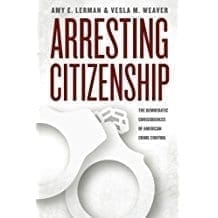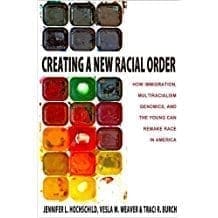
Vesla Weaver
Bloomberg Distinguished Professor of Political Science and Sociology
Contact Information
- vesla@jhu.edu
- Curriculum Vitae
- 272 Mergenthaler Hall
- SP25: M 2:30pm-4:00pm / By Appt
- Personal Website
Research Interests: American politics, racial inequality and politics, policing and incarceration, democratic citizenship, American political development, mixed methods
Education: PhD, Harvard University
Vesla Mae Weaver (Ph.D., Harvard, Government, and Social Policy) is the Bloomberg Distinguished Professor of Political Science and Sociology at Johns Hopkins University, a nonresident senior fellow at the Brookings Institution, and faculty affiliate of the Justice Collaboratory at Yale University. A scholar of American politics, she writes about race, power, and political life. Weaver has produced leading scholarship and pioneered concepts to understand the role of incarceration and policing in race-class subjugated communities and the development and consequences of coercive institutions in American democracy. Weaver’s books include Arresting Citizenship and Creating a New Racial Order. Her next book, The State From Below: Racial Authoritarianism in US Democracy, amasses the most extensive collection of first-hand accounts of the police—by those who are policed—to date, using a new civic infrastructure called Portals. She co-directs the American Prison Writing Archive, the largest and first fully searchable digital archive of imprisoned people writing about their experience inside confinement in four hundred prison and jail facilities. Such projects unite a concern with positioning the unfree as central theorists of democracy. Weaver’s research has been supported by fellowships from the Andrew Carnegie Foundation (2017 fellow), Russell Sage Foundation, National Science Foundation, the Ford Foundation, the Brookings Institution, and owes her beginnings as a political scientist to the Ralph Bunche Summer Institute. She has written in the New York Times, Washington Post, Boston Review, Marshall Project, and Slate, among others. And she takes an active role in public debates about what it might mean to construct public space focused on civic health rather than surveillance.
Academic Articles
- "A people's abolition: How policed communities describe and enact liberatory futures"
- My Group or Myself? How Black, Latino, and White Americas Choose a Neighborhood, Job, and Candidate when Personal and Group Interest Diverge
- Withdrawing and Drawing In: Political Discourse in Policed Communities
- Racial Authoritarianism in U.S. Democracy, Science Magazine
- Depolicing America’s Youth: Disrupting Criminal Justice Policy Feedbacks that Distort Power and Derail Prospects
- The State from Below: Distorted Responsiveness in Policed Communities
- Too Much Knowledge, Too Little Power: An Assessment of Political Knowledge in Highly Policed Communities
- The Great Decoupling: The Disconnection between Criminal Offending and Experience of Arrest Across Two Cohorts
- More security may actually make us feel less secure
- Police Are Our Government: Politics, Political Science, and the Policing of Race-Class Subjugated Communities
- Staying out of Sight? Concentrated Policing and Local Political Action
- Political Consequences of the Carceral State
- Frontlash: Race and the Development of Punitive Crime Policy
- Between Reconstructions: Congressional Action on Civil Rights, 1890-1950
- Is the Significance of Race Declining in the Political Arena? Yes, and No
- Destabilizing the American Racial Order
- “There’s No One as Irish as Barack O’bama”: The Policy and Politics of American Multiracialism
- The Skin Color Paradox and the American Racial Order
- The Electoral Consequences of Skin Color: The “Hidden” Side of Race in American Politics
- Black Citizenship and Summary Punishment: A Brief History to the Present
- Forthcoming Articles, Published Essays, and New Research: here
Op-Eds & Reviews
- Vox.com: How a 50-year-old report predicted America's current racial reckoning
- Washington Post: We listened to people in highly policed U.S. communities
- Niskanen Center Podcast: How Overpoliced Communities Become Politically Engaged
- Scholars.org: Black Lives Matter, Police, and America's Democracy
- Financial Times: A History of Police Funding
- WYPR.org: Can Protest Yield Police Reform?
- Vox.com: “The Kavanaugh hearings show who we afford a second chance and who we don’t”
- Vox.com: Why white people keep calling the cops on black Americans
- Boston Review: The Untold Story of Mass Incarceration
- New York Times: Did Blacks Really Endorse the 1994 Crime Bill?
- New York Times: Is the United States a ‘Racial Democracy’?
- Boston Review: The Only Government I Know
- Marshall Project: The Missed Opportunity of Robert Woodson
- Slate: Protest is Democracy at Work
- Baltimore Sun: High Incarceration may be more harmful than high crime
- Balkinization Blog: The Missing Lesson of Ferguson: Conduct ≠ Contact
- The Conversation: On Baltimore and Freddie Gray
- The Conversation: On Walter Scott and police misconduct (reprinted in Newsweek and the New Republic)
- Yale Daily News: Recognize, Revalue, and Rid

Arresting Citizenship: The Democratic Consequences of American Crime Control
co-author
University of Chicago Press ,
2014

Creating a New Racial Order: How Immigration, Multiracialism, Genomics, and the Young Can Remake Race in America
co-author
Princeton University Press ,
2012